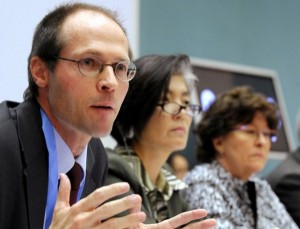Project Syndicate | 4 June 2010 | français · español
by Olivier De Schutter
BRUSSELS – The World Bank, the United Nations Food and Agricultural Organization (FAO), the International Fund for Agricultural Development (IFAD), and the UN Conference on Trade and Development (UNCTAD) Secretariat recently presented seven “Principles for Responsible Agricultural Investment.” The principles seek to ensure that large-scale land investments result in “win-win” situations, benefiting investors and directly affected communities alike. But, though well-intended, the principles are woefully inadequate.
It has been several years since private investors and states began buying and leasing millions of hectares of farmland worldwide in order to secure their domestic supply of food, raw commodities, and biofuels, or to get subsidies for carbon storage through plantations. Western investors, including Wall Street banks and hedge funds, now view direct investments in land as a safe haven in an otherwise turbulent financial climate.
The scope of the phenomenon is enormous. Since 2006, between 15 and 20 million hectares of farmland, the equivalent of the total arable surface of France, have been the subject of negotiations by foreign investors.The risks are considerable. All too often, notions such as “reserve agricultural land,” or “idle land,” are manipulated out of existence, sometimes being used to designate land on which many livelihoods depend, and that is subject to long-standing customary rights. The requirement that evictions take place only for a valid “public purpose,” with fair compensation, and following consultation of those affected, is honored more in the breach than in the observance.
In Africa, rural land is generally considered to be state-owned, and is treated by governments as if it were their own. In Latin America, the gap between large landowners and small peasants is widening. In South Asia, many populations are currently being driven off their ancestral land to make room for large palm-oil plantations, special economic zones, or re-forestation projects.
The set of principles that have been proposed to discipline the phenomenon remain purely voluntary. But what is required is to insist that governments comply fully with their human rights obligations, including the right to food, the right of all peoples to freely dispose of their natural wealth and resources, and the right not to be deprived of the means of subsistence. Because the principles ignore human rights, they neglect the essential dimension of accountability.
There is also a clear tension between ceding land to investors for the creation of large plantations, and the objective of redistributing land and ensuring more equitable access to it. Governments have repeatedly committed themselves to these goals, most recently at the 2006 International Conference on Agrarian Reform and Rural Development.
The underlying problem runs deeper than how the principles have been formulated. The promotion of large-scale land investment is based on the belief that combating hunger requires boosting food production, and that supply has been lagging because of a lack of investment in agriculture. Hence, if investment can be attracted to agriculture, it should be welcomed, and whichever rules are imposed should encourage it, not deter it.
But both the diagnosis and the remedy are incorrect. Hunger and malnutrition are not primarily the result of insufficient food production; they are the result of poverty and inequality, particularly in rural areas, where 75% of the world’s poor still reside.
In the past, agricultural development has prioritized large-scale, capitalized forms of agriculture, neglecting smallholders who feed local communities. And governments have failed to protect agricultural workers from exploitation in an increasingly competitive environment. It should come as no wonder that smallholders and agricultural laborers represent a combined 70% of those who are unable to feed themselves today.
Accelerating the shift towards large-scale, highly mechanized forms of agriculture will not solve the problem. Indeed, it will make it worse. The largest and best-equipped farms are highly competitive, in the sense that they can produce for markets at a lower cost. But they also create a number of social costs that are not accounted for in the market price of their output.
Smallholders, by contrast, produce at a higher cost. They are often very productive by hectare, since they maximize the use of the soil, and achieve the best complementary use of plants and animals. But the form of agriculture that they practice, which relies less on external inputs and mechanization, is highly labor-intensive.
If smallholders compete in the same markets as the large farms, they lose. Yet they render invaluable services, in terms of preservation of agro- and biodiversity, local communities’ resilience to price shocks or weather-related events, and environmental conservation.
The arrival of large-scale investment in agriculture will alter the relationship between these worlds of farming. It will exacerbate highly unequal competition. And it could cause massive social disruptions in the world’s rural areas.
Certainly, agricultural investment should develop responsibly. But, while many have seen the scares provoked by spiking food prices in recent years as an opportunity for investment, opportunities should not be mistaken for solutions.
To re-launch agriculture in the developing world would require an estimated $30 billion per year, representing 0.05% of global GDP. But how much is invested in agriculture matters less than the type of agriculture that we support. By supporting further consolidation of large-scale monocultures in the hands of the most powerful economic actors, we risk widening further the gap with small-scale, family farming, while pushing a model of industrial farming that is already responsible for one-third of man-made greenhouse-gas emissions today.
It is regrettable that, instead of rising to the challenge of developing agriculture in a way that is more socially and environmentally sustainable, we act as if accelerating the destruction of the global peasantry could be accomplished responsibly.













